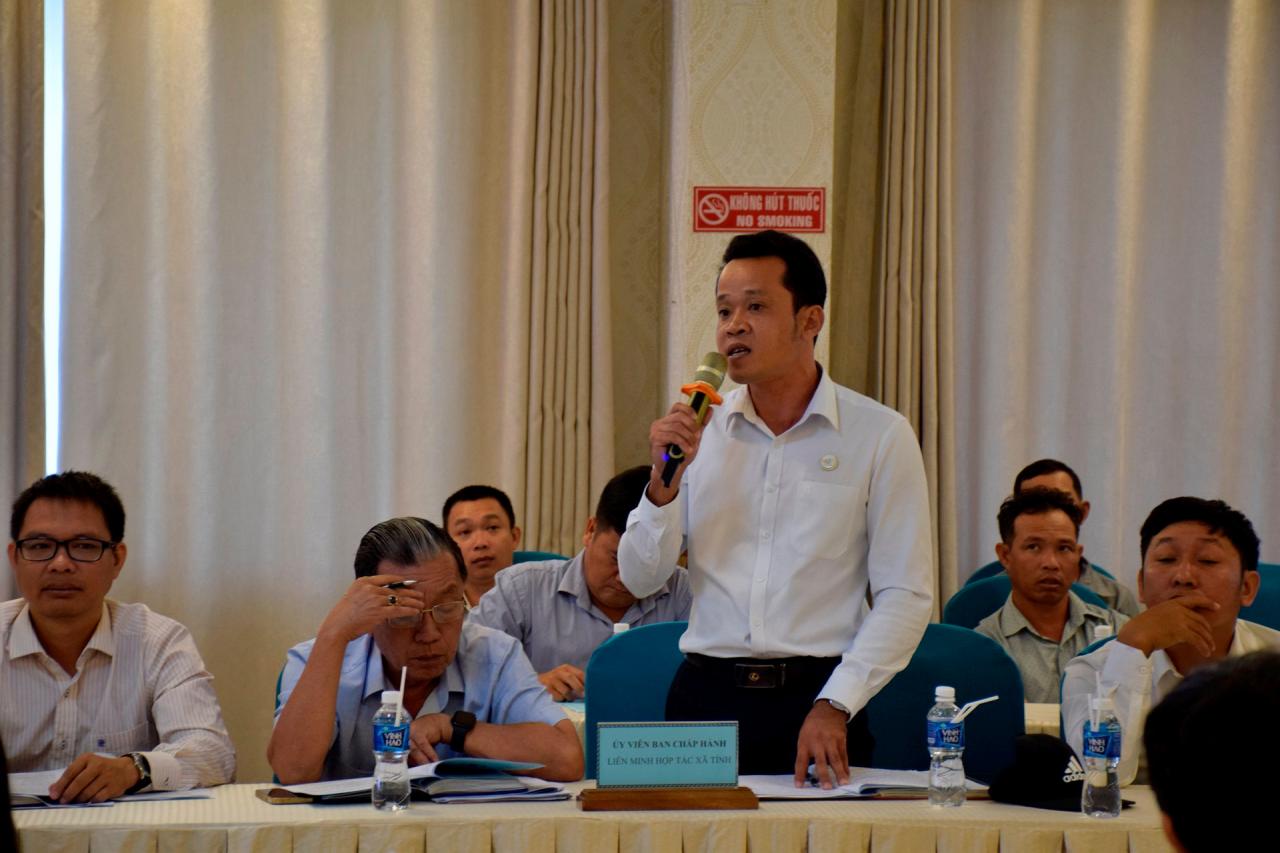At the 2024 Cooperative Economy Forum, Prime Minister Pham Minh Chinh emphasized: “Cooperatives must be aware and proactive in overcoming inherent barriers and obstacles to be self-reliant and self-reliant, rising from their own hands, sky, and land. Do not wait or depend on others; strongly change both thinking and action towards strong application of modern science and technology; green transformation, digital transformation, circular economy, knowledge economy, sharing economy…”.
The forum was held with the theme "Improving the State's support policies according to Resolution No. 20 - NQ/TW - Driving force for the development of collective economy and cooperatives in the new period". The Prime Minister also stated: In recent years, the Party, the State, the Government, all levels, sectors and localities have always paid attention to and issued and implemented many policies, mechanisms and policies to develop collective economy and cooperatives. Up to now, the collective economy sector has basically overcome the prolonged weakness. Cooperatives have basically completed the transition to a new model. The number of newly established cooperatives and cooperative unions has increased significantly, with more diverse development in terms of occupations, scale and qualifications; better support for members, creating jobs and increasing income for workers. The connection between cooperatives and with enterprises and other economic organizations has initially developed.

With many creative ways, in recent years, the transformation of the model from the old, ineffective cooperative model to the new, autonomous, self-responsible cooperative model in the whole country in general and in Binh Thuan in particular has been basically completed. Collective economy and cooperatives play an important role in developing large-scale agricultural commodity production areas, serving processing and export in many localities and contributing to economic growth.

Up to now, the whole country has more than 31,700 cooperatives, 158 cooperative unions and 73,000 cooperative groups. In Binh Thuan alone, by the end of 2023, the whole province had 219 cooperatives, an increase of 5.3% compared to the same period in 2022, with a total of nearly 50,000 cooperative members. Of which, 197 cooperatives are operating (up to 146 cooperatives operating in the agricultural sector). During the year, 15 new cooperatives were established and 5 cooperatives were dissolved. In the collective economic sector, cooperatives have had stable development in terms of quantity, revenue, profit and labor income. Last year, the average revenue of cooperatives in our country reached nearly 3.6 billion VND/year, an increase of 35%; the average profit was about 366 million VND/year, an increase of 71% over the same period.

According to the General Statistics Office, in 2023, the collective economy and cooperative sector will contribute nearly 4% to GDP. In the One Commune One Product (OCOP) Program, there are more than 5,300 entities nationwide; of which, 38.1% of OCOP products are from cooperatives. The role of collective economy and cooperative economy in implementing social security policies and poverty reduction has been actively promoted, contributing to the development of rural cultural life.

However, the development of the collective economy and cooperative economy of the whole country in general and of each locality in particular is not commensurate with the potential, requirements and demands in the current period of deep integration. The growth rate of collective economy and cooperatives is only 50% of the general growth rate of the economy. Even the proportion of contribution to GDP of this sector has tended to decrease in recent years. The most specific evidence is that the contribution to GDP of collective economy and cooperatives from 2001 to 2020 has decreased from 8.06% to 3.62%. In particular, Resolution No. 20-NQ/TW also clearly stated: "Although there are many preferential and support policies for collective economy, they are scattered, mainly integrated, lacking concentration, inconsistent, lacking resources or not feasible".
In addition, the production and business of many cooperatives are still not highly effective and have not been able to spread. On the other hand, the organizational and management level of cooperative staff still has many shortcomings, lacking and weak in management capacity. The number of cooperative management staff with elementary and intermediate qualifications is only 36%; college and university qualifications are only 23%. At the same time, there are still obstacles in procedures to access capital sources, so many businesses and units are still not interested in investing in the collective economic and cooperative sectors.
Recently, many cooperatives in the province have had a different way of thinking and doing things. They have promoted local strengths and boldly invested in technology to expand the production of high-quality goods for export. Many OCOP products have been recognized as meeting 4-5 star standards, making it convenient to develop into consumer goods. To do that, in addition to accessing capital, the role of the head of the KTTT and cooperatives is very important. They must be dynamic, creative, and always focus on customer marketing and product output.
Therefore, through the forum, the Prime Minister requested ministries and branches to soon promulgate and implement the Law on Cooperatives 2023. Continue to review, propose mechanisms and policies, mobilize resources to support cooperatives, especially in terms of infrastructure, technology, capital, investment, and trade promotion. Provinces and cities proactively arrange funding sources to support key and focal economic zones; strongly promote digital transformation. In addition, cooperatives should also strengthen links between members, contributing to job creation and increasing income for members and workers... Economic organizations must innovate their thinking and act decisively and effectively.
Because, "The market economy is an important economic component that must be consolidated and developed together with the State economy to become a solid foundation of the national economy" - as Resolution No. 20-NQ/TW, Session XIII, has determined.
Source



![[Photo] General Secretary To Lam, Secretary of the Central Military Commission attends the 12th Party Congress of the Army](https://vphoto.vietnam.vn/thumb/1200x675/vietnam/resource/IMAGE/2025/9/30/9b63aaa37ddb472ead84e3870a8ae825)
![[Photo] Solemn opening of the 12th Military Party Congress for the 2025-2030 term](https://vphoto.vietnam.vn/thumb/1200x675/vietnam/resource/IMAGE/2025/9/30/2cd383b3130d41a1a4b5ace0d5eb989d)
![[Photo] The 1st Congress of Phu Tho Provincial Party Committee, term 2025-2030](https://vphoto.vietnam.vn/thumb/1200x675/vietnam/resource/IMAGE/2025/9/30/1507da06216649bba8a1ce6251816820)
![[Photo] President Luong Cuong receives President of the Cuban National Assembly Esteban Lazo Hernandez](https://vphoto.vietnam.vn/thumb/1200x675/vietnam/resource/IMAGE/2025/9/30/4d38932911c24f6ea1936252bd5427fa)
![[Photo] Panorama of the cable-stayed bridge, the final bottleneck of the Ben Luc-Long Thanh expressway](https://vphoto.vietnam.vn/thumb/1200x675/vietnam/resource/IMAGE/2025/9/30/391fdf21025541d6b2f092e49a17243f)






























































































Comment (0)